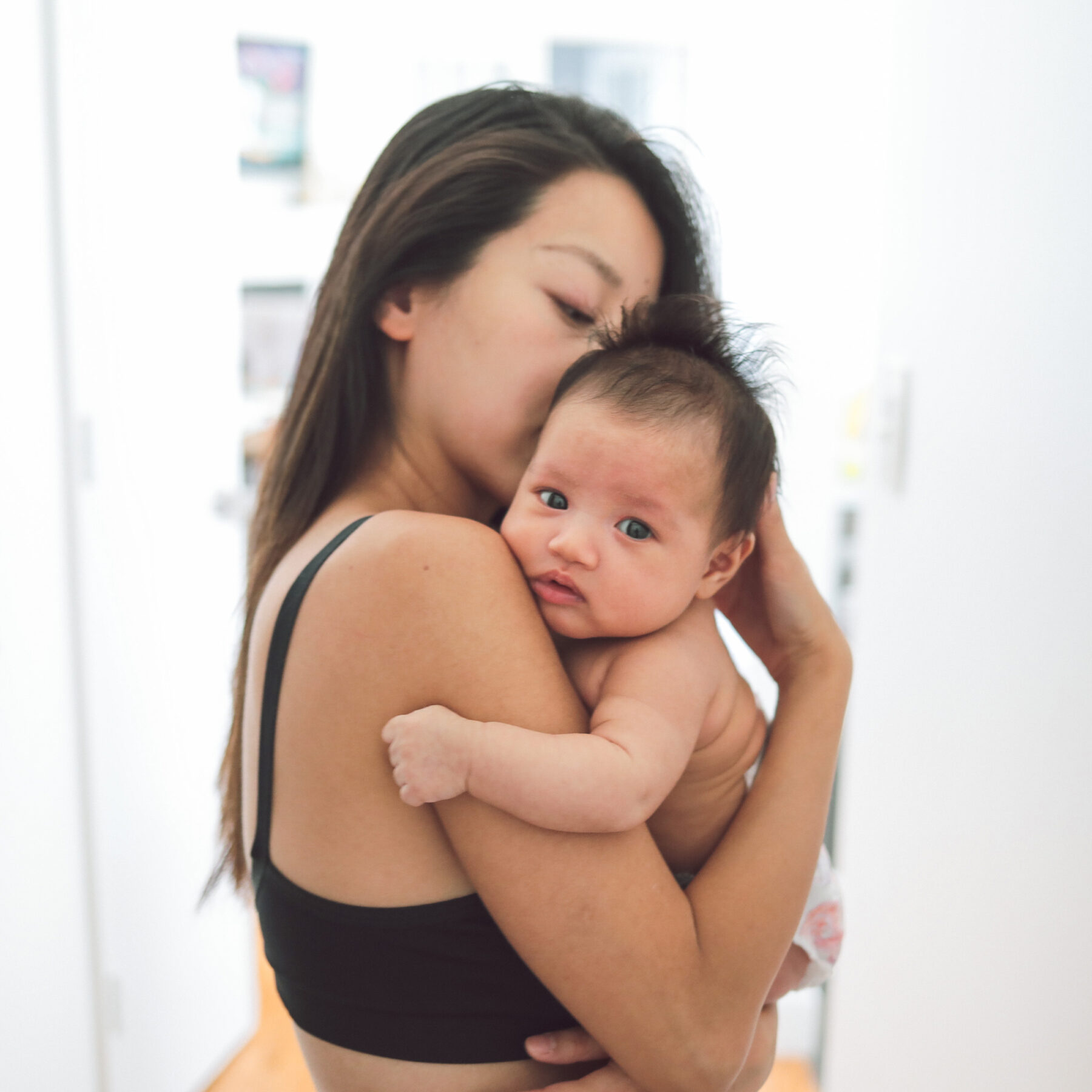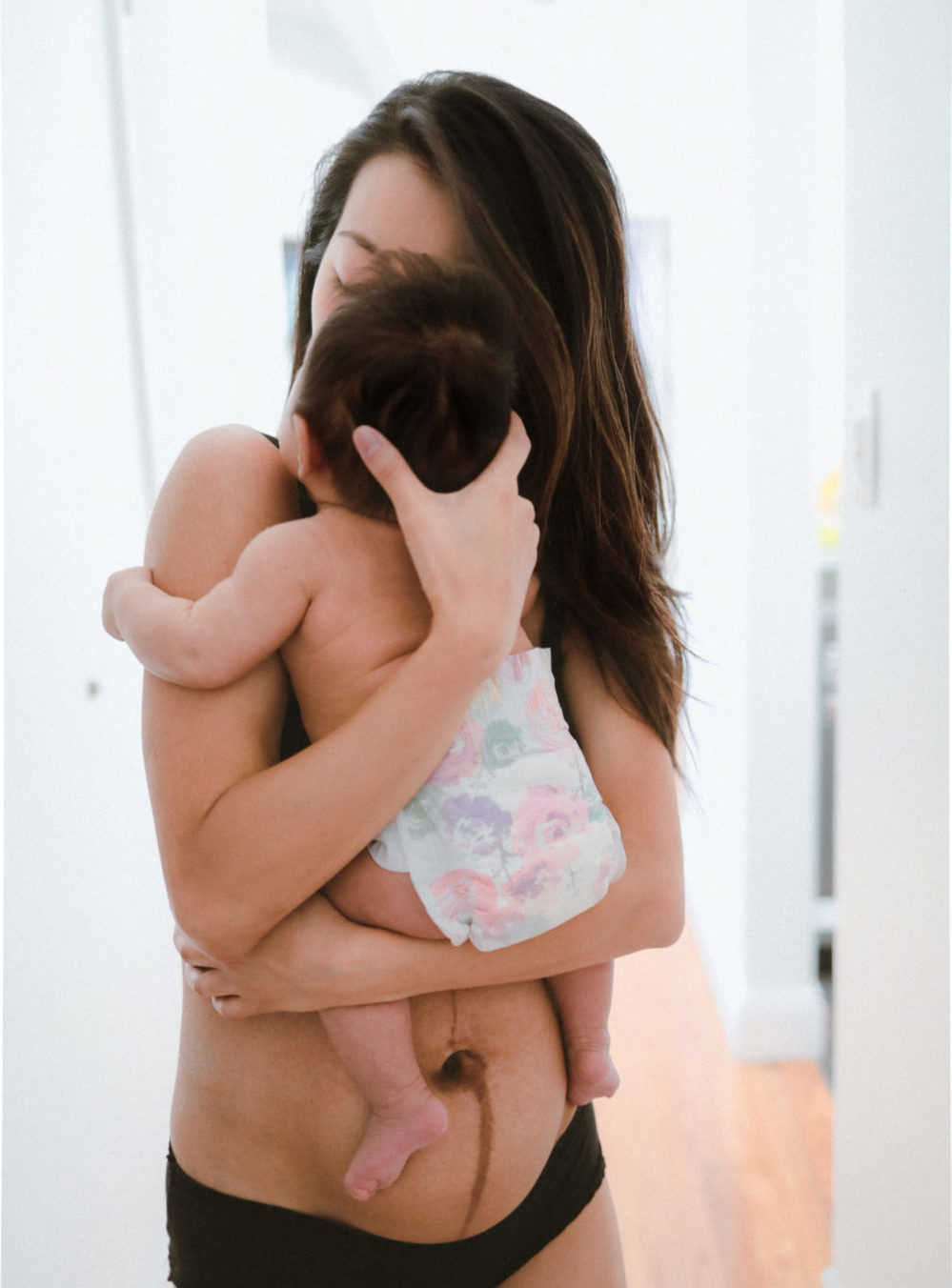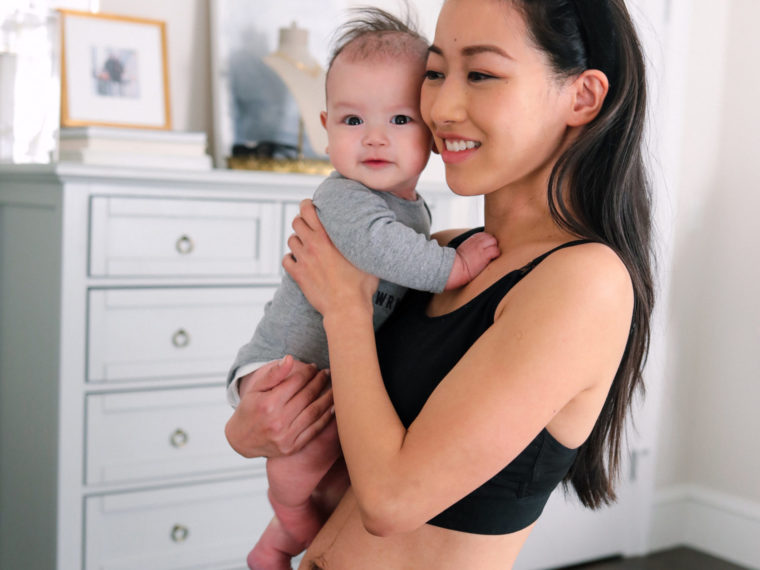
I’ve never been so nervous to share about something. Part of it is the stigma surrounding mental health. And also the fear of being judged. Or that some will see it as complaining about motherhood, after we were so fortunate to be able to have a baby. And truth be told, it’s still hard for me to acknowledge that I struggled with PPD.
Society and social media tell us that moms are strong. That we are superheroes capable of everything and anything. But the reality is, that’s not always the case and especially not right off the bat. It took me months to acknowledge this, but admitting that you’re having a hard time does NOT mean you don’t love your baby, that you’re not trying your best, or that you’re not grateful. And I hope that by sharing my experience, another mom who is struggling might feel less alone and less afraid to seek help.
PPD Feels different for everyone
It’s normal for many women to experience postpartum blues in the immediate weeks after giving birth, due to the crash in hormones compounded with sleep exhaustion. But if it extends beyond a few weeks or you have more severe symptoms, it could be postpartum depression. For me, the best way I can describe it is it felt like wading through a fog of guilt, uselessness, and anxiety. It was a fog that I had no idea I was in until I was out of it, but looking back with a clear mind, it seems obvious.
After touching upon this on IG stories, I learned that it affects so many of us yet is rarely discussed. It can materialize in different forms and intensities, not just the “I want to hurt myself or my baby” kind that most people think of. One of my good friends who appeared to transition seamlessly to motherhood recently told me (very briefly and dismissively) that she went on antidepressants after giving birth. Another rockstar mom friend unexpectedly shared that she was in therapy for PPD. It reminds me that you never really know what someone else might be going through.

My Experience with POSTPARTUM DEPRESSION
The Guilt of Not Bonding
I always heard moms talk about the immediate bond they felt with their new baby. I thought that because I grew her in my belly for 9 months, that I’d intuitively be able to comfort her. But this didn’t happen, and it tore me apart. Nori cried a LOT as a newborn due to bad reflux, gas, and related pains. I would hand our crying baby to Nick while sobbing that I couldn’t console or soothe her, or I’d sometimes go blank and emotionally shut down. I said things like my baby hates me, and I felt unfit as a mom. And then I’d feel terribly guilty for even feeling that way, leaving me in a cyclical rut.
Feelings of Not Enough
I constantly wondered if I was enough for my baby. Doing enough, being enough. We had doctor visits every day the first week home due to jaundice, and then shortly afterwards, Nori ended up in the ER and was hospitalized for a week with an umbilical cord infection. Even though the doctors told me that I did not do anything wrong, I of course felt like it was my fault.
Breastfeeding Ups & Downs
I’ve always been a subscriber to “fed is best,” but the first few times we supplemented with formula, I had to leave the room with tears streaming down my face. I’ve had more ups and downs since, but feel fortunate to still be breastfeeding her at 6 months. I can only imagine how more severe breastfeeding challenges or complications could contribute to a new mama’s anxiety.
Feeling Hopeless and Overwhelmed
One of the things I wasn’t prepared for was the around-the-clock care aspect. Nursing every 2 hours combined with endless laundry from blowouts, daily doctor visits, blood tests, and medication routine felt like a continuous cycle of care and crying during which days and nights blurred together.
When Nick’s 2 weeks of paternity leave was coming to an end, I broke down and told him I couldn’t do it. I know a lot of mamas don’t even have this option, so I’m extremely grateful he was able to take unpaid leave to take care of both of us. During this time we also started Nori on reflux medication which helped a bit with her around the clock discomfort. But it was still hard to imagine a time when it would get easier. I was so focused on trying to care for my baby, I overlooked taking care of myself.
6 Months Later
The heavy feelings and tears still feel incredibly fresh, and I often wonder whether they’d come back one day as quickly as they had faded around 3 months postpartum. Part of getting through it was just time, but I wanted to share some other things that helped or that I could’ve done more of early on.
A few things that may help WITH POSTPARTUM DEPRESSION
1. Setting up a support system before giving birth.
Talk to your partner, friends and family before giving birth and line up a support system to help take care of YOU (not just the baby) and recognize signs. It’s very hard to realize symptoms of PPD yourself while in the depths of it.
Nick would encourage me to talk about some of the things I was feeling and why I was crying, even though most times there was no explanation or even if I felt the reason was silly. When some of my mama friends checked in and really listened, it meant the world to me to just to be able to talk candidly.
2. Move up your 6-week checkup if needed, and be candid with your doctor.
Your baby goes for regular checkups within days after leaving the hospital, yet most women in the US don’t have a checkup with their OB until 6 weeks after giving birth. This opens the door for physical complications from birth to go untreated, and for PPD symptoms to go unidentified and untreated, since caring for yourself can really fall to the back burner during those early weeks.
When I finally made it to my 6-week checkup, I tried to be chirpy and downplayed pretty much everything I was feeling. My doctor implored me to get help at home after hearing that it was just going to be me without family living nearby. She also talked about late onset PPD and how she sees it increasingly more around the 6-month postpartum mark.
3. Try to leave the house once a day (after taking sufficient time to heal from giving birth)
This helped me a lot not just because of the fresh air, but just to have one attainable “goal” and routine each day for you and your baby. This is unfortunately harder in the winter, but I feel like when it’s cold and dark it’s all the more important just to get out of your house once a day.
4. Actually accept help and ask for it if needed
Friends, family, and hired help. If you can afford to hire help for house cleaning, ordering food instead of cooking (or prepare frozen meals well in advance), nannies or night nurses, get the help that you need and don’t let it make you feel like less of a wife or mom.
Also, this was hard for me to do, but say YES when someone offers to help. And don’t be afraid to ask for it and to be specific if someone can offload some small tasks or errands for you.
5. Know when to get off social media
I think I can speak for many of us that it’s easy to fall into the comparison trap, and come across something on social media that makes you feel “less than.” I saw fellow women making motherhood seem effortless. I saw posts about their babies being angels, and how being a mom felt so natural and brought more joy than they ever could’ve imagined. I saw these posts and struggled to relate, and knew I had to stop scrolling and comparing myself.
6. Join a new mom group
Whether it’s online or in your city, I found that talking to other moms in a similar situation was one of the most helpful things I could do. That being said…
7. Addressing Mom-shaming
I wanted to touch on this because it’s gotten so prevalent in today’s world. After having a baby, it was as if the floodgates were open for unsolicited criticism, and the most disheartening thing is it’s mostly from fellow moms. People often forget that social media is a snapshot of a moment in someone’s life. Those early weeks, I lost count of the unkind messages about going through IVF just to have a “photo prop” or “clickbait,” for getting dolled up for staged Instagram photos instead of bonding with my baby at home, for causing her to be sick in the hospital due to neglect, for being inconsiderate of other new moms by wearing regular clothes too soon…the list goes on. There were also dozens of people who continuously created new accounts to harass me (and still do!) about my baby or call her ugly, including some downright racist comments.
I thought I’d developed thick skin from blogging for so long, but during the postpartum fog, this brought me down to a new low. I remember those negative messages echoing word for word in my head, wondering how people knew to kick you when you’re most vulnerable. I ended up posting infrequently and set a timer on Instagram, and I stopped checking direct messages at that time since those often got the most nasty.
Mom shaming doesn’t occur only on social media though – friends to family to strangers will also be quick with opinions and judgements. It’s important to trust yourself and remember that you’re doing your best. And it always helps to surround yourself with positive souls, and take time away from those who tend to bring you down.
To fellow moms who may be struggling right now, I’m sending you hugs, and a reminder that this too shall pass.
Did you experience postpartum depression or anxiety? What are some things that helped you cope?




